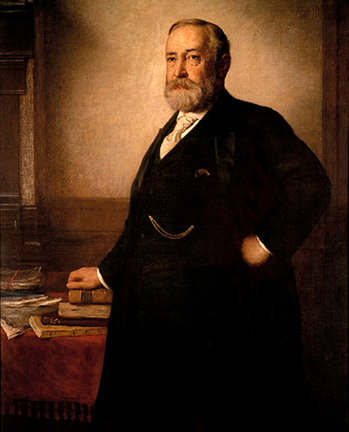In April 1891, two years after being in office, President Benjamin Harrison (1833-1901), the 23rd President of the United States (grandson of William Henry Harrison, the 9th President) had begun what was widely regarded as a perilous 9,000-mile journey by train. After the President rolled out of Washington Station, the next morning's newspapers were studded with quotes at each brief stop of well-expressed speeches for which he was known.
At Roanoke, Bristol, Johnson City, Jonesboro, Greeneville, Morristown and Knoxville, he was warmly received, not only by members of his own faction, but also by citizens of sundry opinions who wanted to get a peek at their leader.
The president was recognized for his cleverness in making short, sudden, fugitive addresses, such as were well-suited for a hurried long railroad excursion across the vast country. In these addresses, he was not afraid of politics but talked unreservedly of thorny issues.

President Benjamin Harrison
Although his trip was deemed perilous, it was not assumed that anything might happen physically to the state-of-the-art vestibule vehicle that carried his entourage along the way. It was made of the best available rolling stock available and equipped with the most modern safeguards and luxurious components available. The chances were all together in favor of its carrying him comfortably over many miles without problems.
Although it was possible that the vehicle could encounter spread rails, which would cause it to leave the tracks, tumble through an open drawbridge, fall down a steep embankment or come upon a railway bridge too weak to support it, a transportation calamity of this magnitude was highly improbable.
What his supporters regarded as the real danger of the long trip was that the President might foolishly, by some careless words and actions, cause harm in his getting his party's future nomination at the Republican National Convention of 1892. In spite or his public speaking skills, he was especially vulnerable because his first term was anything but stellar. His detractors had a lot to talk about.
For those critics who said that the president, a brigadier general, was, figuratively speaking, riding along with full intention of acquiring the nomination, he was cautioned that even the ablest man was apt to make mistakes in circumstances far less trying than his.
Then, assuming that the central figure avoided all blunders of his own, the unexpected was always likely to happen, events over which he had no control, but which could be embarrassing to him and hurtful to his political future. The rule which used to hold back the public appearance of an avowed candidate, one even whose name was already upon the ticket, was founded as much on good sense as on conventional correctness.
Mr. Harrison was a man of first-rate common sense, whatever might have been the measure of his other qualities. He was not usually at the mercy of his impulses. Perhaps he was not on his way to the next presidential convention as many suggested, but possibly the primary motive to his long journey was to see the vastness and beauty of the American countryside.
His critics would not accept such a theory, being convinced to the contrary. Yet there were those who believed that no other explanation could be found for the fact that a self-contained, cool, careful man seemed to fly flatly in the face of the old English axiom: “To stay at home is best.”
However, the President did not shy away from certain controversial subjects such as the McKinley Law that raised the average duty on imports to almost fifty percent, an act designed to shield domestic industries from foreign competition. He was equally explicit and emphatic in regard to the radical principles underlying the law.
No mention was made of where in Johnson City the train stopped, how long it remained there or the size of the crowd that assembled to hear their president. This was before the Southern Depot that many of us remember was located between W. Market and N. Roan was built.

Comments are closed.